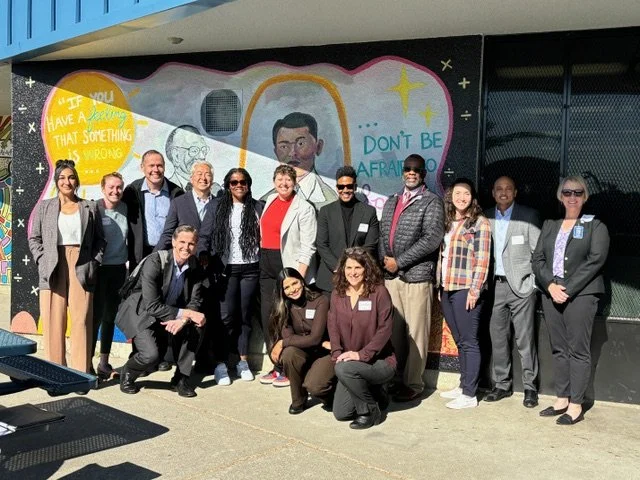AB 1454: A Turning Point in California Literacy & What Advocates Can Learn
Updated: October 9, 2025
On October 9, 2025, California passed AB 1454, a landmark early literacy bill and a major step toward securing all students’ civil right to read. This bill is the third and final piece of a policy puzzle, completing California’s comprehensive science of reading legislative framework:
Senate Bill 488—Teacher Preparation
Passed: October 8, 2021
Requires California teacher preparation programs to align with new literacy standards grounded in the science of reading by July 2024 and replace the Reading Instruction Competence Assessment (RICA) with the Literacy Performance Assessment (LPA).Senate Bill 114—Universal Screening
Passed: July 10, 2023
Mandates annual screening of all California K–2 students for reading difficulties, including dyslexia, beginning fall 2025.Assembly Bill 1454—Evidence-Based Instruction
Passed: October 9, 2025
Provides funding for teacher training, administrator development, and high-quality instructional materials aligned with the science of reading.
Over the summer, AB 1454 passed the Assembly and Senate Education Committee with unanimous, bipartisan support—a monumental feat. Governor Gavin Newsom also included $200 million in the 2025–2026 state budget to fund the bill’s teacher training component.
Now signed into law, AB 1454 will:
Fund paid professional development for TK–5 teachers in evidence-based literacy practices.
Ensure high-quality, research-aligned instructional materials in every classroom.
Equip principals and reading specialists to lead strong literacy implementation.
FULCRUM’s Role: From Practice to Policy
Many organizations in the California Early Literacy Coalition have championed AB 1454, but FULCRUM played a unique role, bringing policymakers into classrooms to witness high-quality literacy instruction in action.
Last fall, FULCRUM partnered with EdVoice and the Oakland Literacy Coalition to host a “Practice to Policy” Literacy Learning Walk (LLW) in Oakland Unified School District. Elected officials observed real-time instruction and joined teachers and school leaders for a panel discussion about the ongoing support that systems need to ensure every student learns to read.
While legislation similar to AB 1454 had been blocked in the past, this LLW proved a pivotal turning point for evidence-based instruction. Hearing directly from educators helped shift policymakers’ perspectives, and soon after, Assemblymember Al Muratsuchi—Chair of California’s Education Committee—co-authored AB 1454 and became one of its most vocal supporters.
Why This Matters for Advocacy
Seeing strong instruction firsthand can change minds. Inviting leaders into classrooms is a simple, replicable way to build support for better curriculum, professional learning, or funding. Pair visits with conversations between policymakers, educators, and school leaders to share successes and identify what is needed to drive better student outcomes.
The Work Ahead: Implementation, Access, and Action
AB 1454 represents a major win, but it is only the beginning. With timelines set by the State Board of Education and the Commission on Teacher Credentialing (CTC), the work ahead will focus on three key areas:
Professional Development—September 1, 2026
The California Department of Education is vetting and approving professional development providers aligned with evidence-based literacy instruction and will produce an approved vendor list. Each district will receive dedicated funds to provide teacher training through these vendors.Instructional Materials Adoption—January 31, 2027
Following a review process, the State Board of Education will produce an approved curriculum list of TK–8 ELA/ELD materials aligned with evidence-based practices. This will help ensure districts adopt high-quality, state-approved curricula.Administrator Standards—September 1, 2028
The CTC is updating the Administrative Services Credential program standards to ensure that administrator preparation programs equip school leaders to support teachers in delivering effective, evidence-based literacy instruction.
What this means for educators and families:
Educators: Planning begins now. Consider how your district will use state-provided professional development funds.
Families and Community Members: Monitor how state-provided funds are used. Ensure your district invests in teacher training.
All: If your district’s curriculum is not aligned with evidence-based practices, be prepared to advocate for the adoption of a state-approved program.
Together, these steps will help ensure AB 1454 delivers on its promise: stronger literacy instruction in every classroom.
A Collective Win for California Kids
AB 1454 adds to the foundation built by SB 114 and SB 488, marking the start of a new chapter for literacy in California. This progress reflects years of advocacy, bipartisan collaboration, and a shared belief that learning to read is a fundamental right.
FULCRUM is proud to have contributed to this historic milestone and remains committed to the next phase: ensuring every student receives the evidence-based instruction they deserve.
Stay informed—subscribe to FULCRUM’s newsletter.

